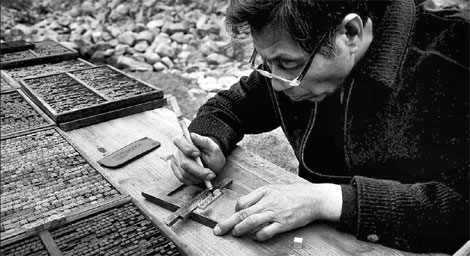Chip off the old block
 An elderly artisan engraves characters on blocks for printing woodblock-typeset genealogies in Dongyuan village, Rui'an, Zhejiang province. Photos by Wu Xiaohuai / For China Daily
|
The age-old craft of Chinese woodblock printing came to global attention at the 2008 Olympics. But in Zhejiang province's Dongyuan village, it is intimately connected to the veneration of clan genealogies. Guo Shuhan reports.
Names - of the living and of the dead - are what drive 55-year-old Wang Chaohui's life. Wang and his fellow villagers in Zhejiang province's Dongyuan are perhaps the last practitioners of the dying tradition of printing woodblock-typeset genealogies.
Wang, who began studying the craft when he was 19, works part-time at the village's Museum of Wooden Movable-Type Printing in Rui'an city.
Demonstrating the technique, Wang gingerly places several blocks, some of which are about 200 years old, on a printing plate. He brushes them with ink and covers them with a large sheet of xuan, or rice paper, face down.
He then sweeps the other side of the paper with a coir brush until the ink from the blocks, on which are carved the mirror image of the characters, bleeds through and a poem appears on the sheet.
For eight centuries, Wang's 200-household village has maintained the tradition, which was featured in a dazzling seven-minute display during the 2008 Beijing Olympic Games Opening Ceremony.
UNESCO also included it in its Intangible Cultural Heritage List in late November.
It was Bi Sheng (990-1051) of the Song Dynasty (960-1279) who invented the country's first printing press, which used baked clay blocks. The woodblock version, developed by Yuan Dynasty (1271-1368) official Wang Zhen, found its highest expression in the craftsmen of Dongyuan.
Thanks to a local veneration of ancestral lineage, the craft is still used to print the clan genealogies of families who settled down in southern Zhejiang and northern Fujian provinces from the Northern Song (960-1127) and Qing (1644-1911) dynasties.
Photographer Wu Xiaohuai, who has documented Dongyuan's moveable-type printing for nine years, says 178 of the 204 families recorded in the chorography came from other parts of the country.
"People here hold fast to traditions and believe a failure to update the genealogy is a gross violation of filial piety," Wu says.
Printing genealogies can be laborious and time-consuming, and in ancient times craftsmen would often have to lug around boxes, weighing more than 30 kg and containing more than 20,000 letters, on shoulder poles to different parts of Zheijiang and Fujian.
Today, the printers have to go door-to-door to conduct their census and even make calls to family members who have moved away.
Some clans also ask that their social ranking be recorded, in addition to names and education levels.
Clan members usually offer free room and board to the printers, who charge 15-30 yuan ($2.26-$4.4) for entering the names of every clan member alive. "Confusing the names of the living and the dead, and confusing clan lines are taboo," Wang Chuanqiao, a provincial-level inheritor of this tradition, says.
Wang, also 55, says he, his brother-in-law and three apprentices once spent a-year-and-a-half updating the genealogy of the Xu clan of some 40,000 people inhabiting eight villages in southern Zhejiang's Fenglin township.
Higher costs and difficulties in ensuring the uniformity of block sizes and ink hues have created a shift toward lead blocks in the past two decades.
"It takes years to master the woodblock technique, which demands exceptional skill in applying ink while ensuring the lettering is clear and the paper does not tear," Wang says.
"But even a novice can get good results with lead blocks. Four pages can be produced with lead blocks in the time it would take to finish two with wooden letters."
He says less than 1 percent of clans opt for woodblocks.
Some printers even suggest computer typesetting to save time and money.
Genealogy printing remained a desirable job until the 1990s, when printers earned at least 40,000 yuan ($6,040) and perhaps more than 100,000 yuan per year if the clan for whom they worked had numerous members or they received many orders from small families.
The change came when younger generations began flocking to the cities for work in early 2000.
"I didn't make any money as an apprentice, but you can't recruit anyone today without paying a stipend," says Wang, whose son and daughter moved to Shanghai after graduating from university.
Today, only 60 of the 1,800 villagers earn their living as printers. The number was more than 100 five years ago.
Only 20 have mastered the 20-step procedure of woodblock printing - from the engraving of characters on the blocks to the final binding of the printed sheets. That includes 11 practitioners officially recognized in 2010 by various government levels as inheritors of the tradition. Most are at least 50 years old.
The provincial government will provide a 6,000 yuan annual stipend to every inheritor starting this January, Rui'an Intangible Cultural Heritage Protection Center director Zheng Jianjun says. Inheritors who recruit an apprentice younger than 30 will receive an additional 2,000 yuan a year.
The Zhejiang provincial administration of press and publication bureau has also requested the founding of a wooden movable-type printing house.
Wang Chaohui spends 10 days a month at the museum, which opened in an ancestral home of his clan in 2004.


















